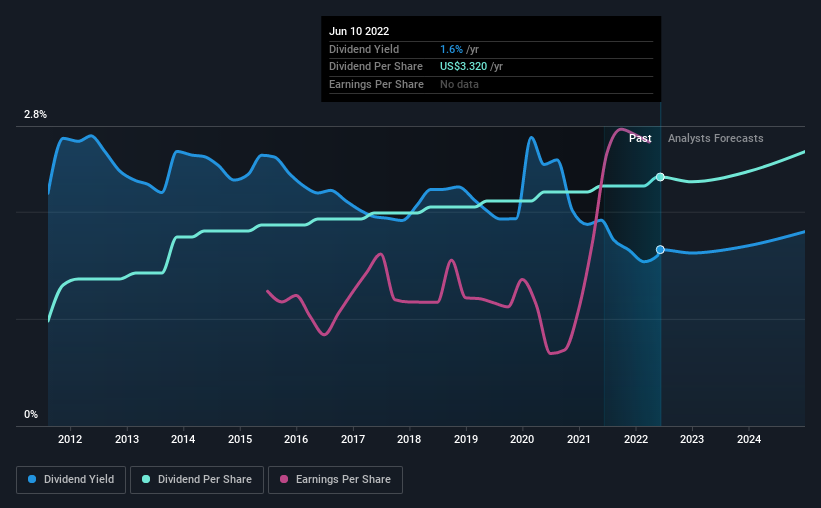Chubb Limited (NYSE:CB) Looks Interesting, And It's About To Pay A Dividend
It looks like Chubb Limited (NYSE:CB) is about to go ex-dividend in the next four days. Typically, the ex-dividend date is one business day before the record date which is the date on which a company determines the shareholders eligible to receive a dividend. The ex-dividend date is important as the process of settlement involves two full business days. So if you miss that date, you would not show up on the company's books on the record date. In other words, investors can purchase Chubb's shares before the 16th of June in order to be eligible for the dividend, which will be paid on the 8th of July.
The company's upcoming dividend is US$0.83 a share, following on from the last 12 months, when the company distributed a total of US$3.20 per share to shareholders. Based on the last year's worth of payments, Chubb stock has a trailing yield of around 1.6% on the current share price of $201.66. If you buy this business for its dividend, you should have an idea of whether Chubb's dividend is reliable and sustainable. As a result, readers should always check whether Chubb has been able to grow its dividends, or if the dividend might be cut.
See our latest analysis for Chubb
If a company pays out more in dividends than it earned, then the dividend might become unsustainable - hardly an ideal situation. Chubb is paying out just 17% of its profit after tax, which is comfortably low and leaves plenty of breathing room in the case of adverse events.
When a company paid out less in dividends than it earned in profit, this generally suggests its dividend is affordable. The lower the % of its profit that it pays out, the greater the margin of safety for the dividend if the business enters a downturn.
Click here to see the company's payout ratio, plus analyst estimates of its future dividends.
Have Earnings And Dividends Been Growing?
Stocks in companies that generate sustainable earnings growth often make the best dividend prospects, as it is easier to lift the dividend when earnings are rising. If earnings decline and the company is forced to cut its dividend, investors could watch the value of their investment go up in smoke. For this reason, we're glad to see Chubb's earnings per share have risen 17% per annum over the last five years.
The main way most investors will assess a company's dividend prospects is by checking the historical rate of dividend growth. In the past 10 years, Chubb has increased its dividend at approximately 9.0% a year on average. It's encouraging to see the company lifting dividends while earnings are growing, suggesting at least some corporate interest in rewarding shareholders.
The Bottom Line
Should investors buy Chubb for the upcoming dividend? Typically, companies that are growing rapidly and paying out a low fraction of earnings are keeping the profits for reinvestment in the business. This strategy can add significant value to shareholders over the long term - as long as it's done without issuing too many new shares. We think this is a pretty attractive combination, and would be interested in investigating Chubb more closely.
In light of that, while Chubb has an appealing dividend, it's worth knowing the risks involved with this stock. Case in point: We've spotted 1 warning sign for Chubb you should be aware of.
If you're in the market for strong dividend payers, we recommend checking our selection of top dividend stocks.
Have feedback on this article? Concerned about the content? Get in touch with us directly. Alternatively, email editorial-team (at) simplywallst.com.
This article by Simply Wall St is general in nature. We provide commentary based on historical data and analyst forecasts only using an unbiased methodology and our articles are not intended to be financial advice. It does not constitute a recommendation to buy or sell any stock, and does not take account of your objectives, or your financial situation. We aim to bring you long-term focused analysis driven by fundamental data. Note that our analysis may not factor in the latest price-sensitive company announcements or qualitative material. Simply Wall St has no position in any stocks mentioned.

 Yahoo Movies
Yahoo Movies 

